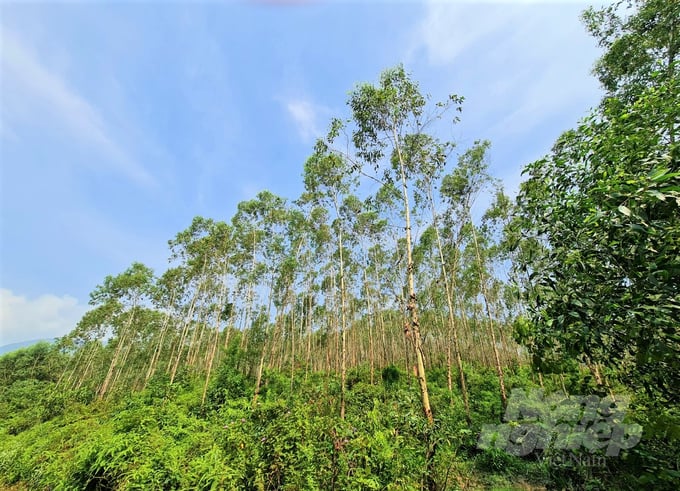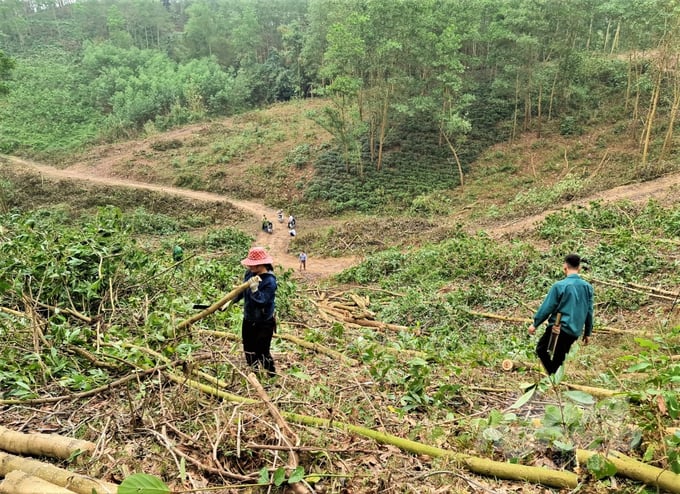May 28, 2025 | 07:37 GMT +7
May 28, 2025 | 07:37 GMT +7
Hotline: 0913.378.918
May 28, 2025 | 07:37 GMT +7
Hotline: 0913.378.918
The purchase price of wood chips in Tuyen Quang has recently gone up to VND 1 - 1.2 million/ton. This is the highest price ever before seen as it was only from VND 700,000 to 800,000/ton a few months ago. The high price of wood chips made many households sell young forests one after another.

The development of large timber forests remains the main goal that Tuyen Quang province is aiming for. Photo: Dao Thanh.
There appears a number of families selling 5 – 6 years old new forest wood in Deo Tuong village, Tien Bo commune, Yen Son district. They are all aware that planting large timber forests would create higher economic efficiency than conventional afforestation, but this model is only suitable for condition-available families or those who have other lines of work that ensure a stable income to sustain life. As for households who rely only on forestry activities, the difficulties are vivid, so when they see that wood chips can be sold at a good price and there are people ready to purchase, they come to the above decision.
The sale of young forests is not only happening in Tien Bo commune but also in many other localities. Nguyen Hoang Giang, Chairman of the People's Committee of Lap Tien commune, said that the price of raw wood chips had increased dramatically during these two recent months, causing some households to sell the forests young. This would surely make them suffer certain losses because the wood at this stage was still young and in the best stage of growth in terms of biomass.
This phenomenon does not take place en masse among households and villages, but only in households with difficult economic circumstances which are in need of money to cover their living expenses or possess bad forest areas. For households with good conditions, most of them are aware of the value of maintaining perennial forests to become large timber forests as the wood will surely improve its value and quality as time passes.

The high price of wood chips pushes many households in Tuyen Quang to the decision of selling young forests. Photo: Dao Thanh.
According to the analysis of export wood processing enterprises, the sale of 4 - 5 years old forest is no different from the act of "taking each dáy as it comes". And although the price of raw wood is very high, in reality the profit does not increase. For example, when selling 1 ha of 4 - 5 years old forest, the majority of output is used for wood chip processing. The trunk has very little value because the wood ring is still small, plus because the forest is still a few years old, the wood is not yet strong, so there is not much value for it as a raw material source for the processing industry.
The profit from 1 ha of 5 – 6 years old forest is currently VND 70 - 80 million. Meanwhile 1 ha of forest from 9 years old and above can earn more than VND 200 million from selling wood as raw materials for furniture processing, and the trunks and small branches can even be used to make minced wood chips.
Vu Van Hoe in Deo Tuong village, Tien Bo commune (Yen Son district) has lived and made a fortune from planting forests for more than 20 years. His family is one of the first households to register for FSC certification for their forest.

The sale of young forests will disadvantage the people themselves, not to mention the possible bad consequences for the wood industry. Photo: Dao Thanh.
Like Hoe’s family, many FSC-certified forest households in Tien Bo commune agree not to sell young forests, because they know that short-term profits mean long-term losses. They also have to be considerate toward the issues of stabilizing raw material areas for large furniture manufacturing companies as well as adhering to the commitment of creating FSC-certified forests and large timber forests within the areas of the locality and Tien Huy Cooperative.
The fact that people race to sell young forests when the price of wood chips is high will cause wood processing factories to lack large wood materials to produce furniture. Large wood processing enterprises are currently having a hard time because of this problem. In the past, when processing peeled wood or heartwood, wood output was often carefully filtered, leaving a very little amount of wood chips. But households who ran after the high prices did not filter carefully, so the source of raw materials for wood processing factories was thus narrowed.
Wood processing enterprises have put out warnings as the act of selling young forests may leave behind devastating consequences for the future of the wood industry. If the situation is not under control soon, approximately 3 to 5 years from now, large timber materials for processing may become scarce, affecting the benefits of many parties involved in the production chain.
Translated by Samuel Pham
/2025/05/25/4127-3-073637_820.jpg)
(VAN) Thanks to the promotion from an FAO-implemented project, vegetable production in greenhouses in Moc Chau has seen strong development, from 1.5 hectares in 2021 to nearly 50 hectares in 2024.

(VAN) FAO has recently supported USD 140,000 to implement the project 'Risk mitigation human-animal interface risks through disease control initiatives in pig farming.'

(VAN) The People's Committee of Tra Vinh province has approved an adjustment to the investment policy for the Green Hydrogen Plant project, increasing its area to approximately 52.76 hectares.
![Reducing emissions from rice fields: [2] Farmers’ commitment to the soil](https://t.ex-cdn.com/nongnghiepmoitruong.vn/608w/files/news/2025/05/05/dsc08881jpg-nongnghiep-140632.jpg)
(VAN) Clean rice cultivation model in Thuong Tan commune, Bac Tan Uyen district, is assisting local residents in achieving sustainable agriculture by substantially reducing costs, increasing productivity, and protecting the environment.

(VAN) At the conference to disseminate Resolution No. 68, AgriS introduced its digital agricultural ecosystem and reaffirmed its commitment to accompanying the Government in promoting private sector development and sustainable agriculture.

(VAN) 'Blue Ocean - Blue Foods' initiative is designed to restore marine ecosystems and establish sustainable livelihoods for local communities by cultivating a minimum of 1,000 hectares of cottonii seaweed in the first three years.
/2025/05/21/4642-3-112707_603.jpg)
(VAN) The V-SCOPE project has made direct contributions to three out of six pillars of the Comprehensive Strategic Partnership between Vietnam and Australia.